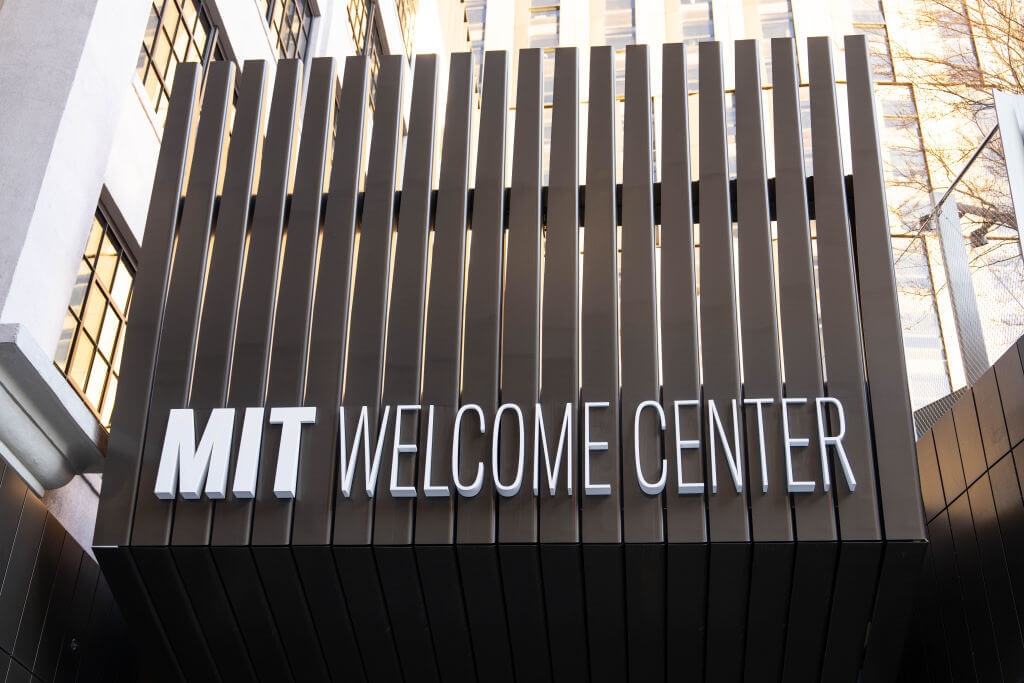Angry at MIT’s Jewish president, a Jewish alumni group has a plot to oust her
Sally Kornbluth is Jewish, but undermining Jewish students, say the MIT alums

A truck with a sign reading “Sally Korbluth is a national disgrace” drives through the MIT campus in Cambridge, Massachusetts on Dec. 12, 2023. Photo by Mel Musto/Bloomberg via Getty Images

A contingent of Massachusetts Institute of Technology alumni are so upset with school’s embrace of the diversity, equity and inclusion movement, and its president’s handling of antisemitism and pro-Palestinian protests, that they have devised a plan to oust her.
“There’s a movement afoot to do a hostile takeover of the MIT Board,” said Arthur Carp, who graduated in 1976 and co-chairs the MIT Jewish Alumni Committee.
The group, he said, aims to replace the officers atop the MIT Corporation, who govern the school and have expressed support for Kornbluth. The new officers would then presumably expel Kornbluth, who is Jewish. “She has turned into a Quisling,” said Carp, referencing an infamous traitor.
His committee, he said, numbers in the hundreds. But it’s unclear how much clout they wield and whether the mechanism for removing an MIT president could be set in motion by their plan. The university declined to comment on it.
And Carp declined to provide more details of the planned takeover effort. He put its chance of success at 70%, though his co-chair, Dan Goldberger, class of 1979, was less optimistic, noting that MIT’s status as a land-grant college, with state legislative oversight, could complicate the plan.
“In the public-company world you rattle your sword, but actually changing a board of directors is very challenging,” said Goldberger. “With a public-private entity like MIT it’s even more challenging.”
An expert on college governance who reviewed MIT’s bylaws pointed out another difficulty the committee will face. “Any alumni effort to gain seats would require significant support from current board members,” said Mary Papazian, executive vice president of the Association of Governing Boards of Universities and Colleges.

The turmoil over Israel’s military campaign in Gaza, and charges that university presidents have done little to protect Jewish students amid pro-Palestinian protests, has already contributed to the downfall of two college presidents, the University of Pennsylvania’s Liz Magill and Harvard’s Claudine Gay.
They had been summoned along with Kornbluth to testify in December before a congressional committee, where Rep. Elise Stefanik, a New York Republican, grilled them about antisemitism on their campuses. All three were lambasted for their lawyerly responses. Under pressure from board members and alumni, including wealthy Jews who said they would stop donating to Penn, Magill resigned. Then Gay, who was also embroiled in a plagiarism scandal, stepped down.
“Two down, one to go,” Stefanik said.
Two Down.
— Elise Stefanik (@EliseStefanik) January 3, 2024
One to Go.
Your silence is deafening @MIT.
Not even an apology issued by your school to date. And zero commitment from your school to combat antisemitism and protect Jewish students.
Accountability is coming. https://t.co/NaQ80PMqTu
Vulnerable?
MIT, like Harvard, Penn and dozens of other universities across the country, has been rocked this year by pro-Palestinian protests. Some Jewish students, alumni and others see the protests as veering into antisemitism. (Some Jews have also participated in the protests; about 50 of MIT’s 770 Jewish students align with Jews for Ceasefire, which says Israel practices apartheid and genocide.)
Police on May 10 arrested 10 protesters during an operation to dismantle an encampment established to pressure the university to withdraw from projects connected to Israel’s military.
Carp and likeminded alumni charge that Kornbluth has coddled the protesters. But they express as much disdain for Kornbluth’s promotion of DEI, which, they say often casts Jews as oppressors and fails to take antisemitism seriously.
A second group, the MIT Jewish Alumni Alliance, has also accused Kornbluth of failing to protect Jewish students, who make up about 6% of the student body. They have reported being kicked out of study groups and student lounges, shoved by protesters and bullied on social media.
“We’re willing to give President Kornbluth time to work things out,” said Matt Handel, co-chair of the alliance. “Our initial hope that she would take charge of certain things hasn’t come to pass. We haven’t called for her resignation, but neither have we given her our endorsement.”
Handel said his group has an email list of about 2,000 and agrees with about 95% of the Jewish Alumni Committee’s agenda. But Carp’s group prioritizes the elimination of DEI and the resignation of Kornbluth. Handel said his group focuses on deterring “all forms of hate” on campus.
In a video message to the MIT community in April, President Sally Kornbluth said the pro-Palestinian encampment breaks campus rules and is unsustainable for the university.
MIT spokesperson Kimberly Allen, asked about the committee’s plan to replace the governing board and president, said the school is grateful for each of its nearly 145,000 living alumni and respects “that there are a range of views across that group on any number of topics” on which her office does not comment. She also declined a request for comment from Gorenberg, the board chair.
Papazian, of the college governing board association, said MIT’s board is structured like a private nonprofit’s, where members are “self-perpetuating,” which means the current members approve new ones.
She added that board service “must be about more than any particular issue or decision — it’s about holding the institution in trust for students, faculty, staff and the community.”
Dancing with DEI
Kornbluth, a cell biologist and the former provost of Duke University, has been at MIT for less than 18 months.

DEI work was growing before she arrived. In 2020, her predecessor created a task force that the next year produced the MIT Strategic Plan for Belonging, Achievement & Composition. Soon after, MIT began requiring applicants for faculty positions to submit statements about their commitment to DEI. Kornbluth added another layer to the DEI infrastructure in January: a newly created position for a vice president for equity and inclusion.
DEI, which has gained widespread acceptance in recent years in schools and workplaces, aims to help assure that members of marginalized groups are represented and respected. Its critics say it pits people of color against white people, and prioritizes identity over merit.
DEI opponents also argue that it often excludes Jews from its definition of marginalized groups. They say DEI ignores antisemitism, and villainizes Jews — and Israel in particular — as embodiments of a power structure that is racist, colonialist, and oppressive.
Carp and his supporters hold that Kornbluth’s acceptance of DEI emboldened protesters to make life on MIT’s campus miserable for its Jews. Thanks to DEI, they say, Jewish students were given little space to mourn after Hamas’ Oct. 7 attack on Israel, and hostility toward Jewish and pro-Israel students goes unchecked.
Kornbluth, testifying before Congress and in statements since Oct. 7, has denounced antisemitism and pledged to reexamine the university’s DEI programs. On May 1, she announced that MIT will no longer require a diversity statement to apply for a faculty job.
“We can build an inclusive environment in many ways, but compelled statements impinge on freedom of expression, and they don’t work,” she said in a statement.
Diversity statements have long been opposed by conservatives and some academics as a form of ideological conformity. But Kornbluth’s retreat from them did not appease those who root campus turmoil in DEI.
“This is the first crumbling of the edifice so painfully and expensively built,” said Carp. “But this doesn’t dismantle it.”
“It’s virtue-signaling, not substance,” and “too little, too late,” said Goldberger. “But I was glad to see it.”
Since the start of 2023, at least 59 bills to roll back diversity efforts at colleges have been introduced in more than two dozen states and Congress, The New York Times has reported.
Eight have become law, including in North Dakota, Texas, and North Carolina. A Texas law implemented in January outlaws DEI offices, diversity statements, and faculty and staff diversity training. The Chronicle of Higher Education has tracked changes at 153 colleges in 20 states to weaken DEI.
Who is Arthur Carp?
The 70-year-old man leading the charge to topple Kornbluth describes himself as a Modern Orthodox Jew. He lives on Long Island, and is CEO of Quantalytics, a privately held cybersecurity firm.
“Quite frankly, I don’t feel like an oppressor when I look at myself in the mirror every morning,” said Carp, decrying DEI as “the opposite of what Martin Luther King tried to accomplish.”
While DEI proponents say it helps ensure everyone gets fair treatment, Carp said it hurts the people it is supposed to help at his alma mater by discouraging them from “assimilating into the MIT infrastructure.”
Carp organized the MIT Jewish Alumni Committee during the campus turmoil that followed Oct. 7 but it was not his first attempt to influence the climate at the university, from which he received bachelor’s degrees in both chemistry and math.
In 2021 he had helped organize the MIT Free Speech Alliance, after the university rescinded an invitation to Dorian Abbot, a University of Chicago geophysicist known for his public criticism of DEI. Abbot had been asked to lecture on his research, but his cancellation was widely understood as a rebuke of his views on DEI. Some faculty and alumni, including Carp, saw the cancellation as the prioritization of politics over science.

Carp, without citing evidence, contends that the turmoil at MIT this fall and spring was fomented by pro-Palestinian students who would not have gained admission to MIT under traditional merit-based standards.
“Our merit-based system, set up by our founder William Barton Rogers in 1861, lasted for more than a century,” said Carp. “It’s what built MIT to what it was at its peak, but it’s well off its peak now.”
Carp in December took a set of demands to Gorenberg, the MIT Corporation chair, who is Jewish. They include elimination of DEI and 154 jobs supporting DEI infrastructure, and the de-emphasis of the humanities and re-emphasis of engineering and science. Carp also demanded the dismissal of Chancellor Melissa Nobles, who he calls the “high priestess of DEI,” as well as Dean of Admissions Stuart Schmill, who is Jewish.
In addition to declining a request for comment from Gorenberg, MIT did not respond to a request to interview Nobles.
Right on the money?
Disgruntled MIT graduates are also expressing themselves by withholding donations.
“More and more alumni are not sending in even one token dollar,” said Carp. “The giving season — November and December — was a disaster. One of my members used to give $750,000 to $1 million a year, depending on circumstances. That didn’t go out this year.”
MIT reported fundraising of $553.3 million in fiscal year 2022-23, down from a record-setting $686.7 million in 2021-22.
High-profile donors, such as billionaire hedge fund manager Bill Ackman, have come out against DEI in recent months. Though Ackman is a Harvard alumnus, Ackman’s wife, Neri Oxman, holds a doctorate from MIT and is a professor at the MIT Media Lab.
Handel’s group of Jewish alumni is also applying financial pressure.
“We’ve encouraged members to make a nominal donation, a $1 check, a $5 credit card payment,” said Handel, who earned his MBA in 1991 from MIT’s Sloan School of Management. “If you don’t give anything it’s assumed you forgot. We want these $1 donations to say, expressly, we didn’t forget. There’s a reason you’re not getting more.”
The disappointing performance of MIT’s endowment fund looms over the Corporation and Kornbluth, said Goldberger. The endowment’s market value declined 2.9% percent in 2022-23, after a decline of 5.3% in 2021-22. “That’s in a world where other investment funds were up in double digits,” said Goldberger. He infers that the endowment is a likely casualty of DEI, in its hiring of investment managers, but acknowledges that he has no evidence to support this charge.
“They’ve spent hundreds of millions on DEI bureaucracy,” said Goldberger, CEO of ElectroCore, which specializes in medical neuromodulation. “Money that could have gone to education and research.”
Further financial pressure could come from a lawsuit filed in March by several MIT students, along with the StandWithUs Center for Legal Justice, which seeks to redress antisemitism through the courts. The plaintiffs allege violations of Title VI of the Civil Rights Act of 1964, which forbids any program receiving federal financial assistance from discriminating on the basis of race, color or national origin.
Carp called Title VI violations an outgrowth of DEI, and warned that more such lawsuits are in the pipeline and threaten more than $1 billion MIT gets from the federal government.
“I’m not looking to make enemies,” he added. “I’m looking to save MIT.”






















